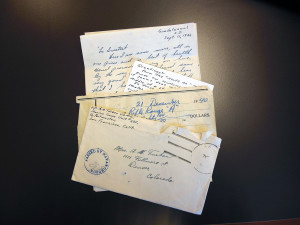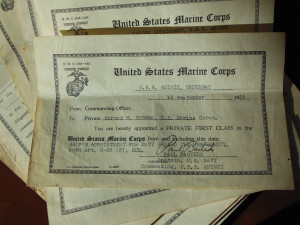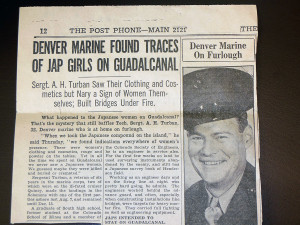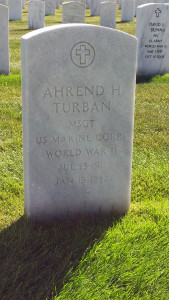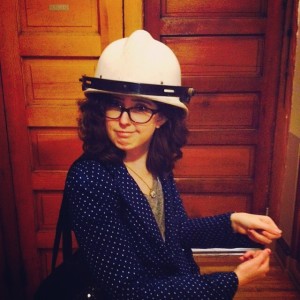Story
A Colorado Veteran’s Tale
Ahrend “Ben” Turban’s Pacific Diary
**Disclaimer: While, of course, the use of the pejorative term “Jap” is no longer tolerated today, writers at the time of World War II used the term liberally. We have left the term intact to preserve the full accuracy of these historical records. Reader discretion is advised.**
There’s often a vast disconnect between those who fight wars and those who remain at home. A manuscript collection recently added to History Colorado’s Archives collection highlights a personal attempt to reconcile this gap. Mr. Ahrend “Ben” H. Turban was born in Denver in 1911 and grew up in various homes for orphans. After attending South High School and the Colorado School of Mines, Ben, as he liked to be called, enlisted in the United States Marine Corps in 1938. He worked as civil engineer and surveyor in major points of military conflict throughout the Pacific, including Guadalcanal, Saipan, and Okinawa.
In 1942 Ben married Eris ‘Jerry’ Duncan. They were quickly separated as Ben was sent to New Zealand en route to combat assignments in the Pacific theatre. Knowing that letters were often heavily censored by the War Department, and worried about explaining his wartime experiences to his wife once he returned home, Ben chose to keep a diary detailing everything from what he missed about home to what kind of horrors he was witnessing on a daily basis. These writings, along with other personal documents, are part of the collection now available to the public.
One of the most frequent topics that Ben noted was how often he received mail from Jerry, and how much that meant to him. Nearly every entry mentions either needing to answer a letter or waiting for one to arrive.
“‘Lo darlin’. Must drop you a note in here before I answer your letter. It is sure surprising how much a letter from you means to me. Just about the time I am about to give up, along comes a letter from you and I am ready to carry on again, a bit battered but still going.” (Aug. 22, ‘44)
Ben kept most of his diary entries short, just snapshots of what that particular day was like.
“Aug 18, 1942: Have been very busy getting my work done and dodging bombs and bullets. So far I can still think of you. No planes as yet and food is getting lower.”
Other entries are long, giving winding descriptions and comparisons of what life post-war will be like. He talks of taking his rifle to bed with him, noting that he hopes it’s a habit he can break when he returns home.
“Sweetheart, that is your only competitor…I think that could be grounds for divorce.” (Sept 18 ‘42)
In one entry he tells Jerry that he dreamed they were at Lakeside “just having one grand time. Hope it comes true soon.” (Sept 28, ‘44) One entry laments the loss of a deck of cards Jerry had sent, the only one in the company. It had to be thrown out after “A big black spider ate on the side of several cards marring the deck”, despite the fact that the deck was kept in Ben’s bunk close to his head.
Ben contracted both malaria and Dengue fever while fighting, and mentions the soldier’s struggle to maintain his mental health as well.
“Boy am I slowly going nuts. Think you can take care of a maniac? Anyway when I get home I’ll need a lot of care even if there isn’t anything wrong with me.” (Aug 17, ‘44)
His entry from July 24, 1944 is especially low, full of descriptions of dead Japanese soldiers, injured children, and snipers lurking everywhere.
“My God!! The beach was littered with dead Japs. I don’t see how we ever will clean that up. It was like a park beach in summer, only the occupants were all in stages of decay and we had to be very careful where we stepped.”
He concludes that entry with this:
“I don’t know why I wrote this all to you as it sure isn’t very nice but it may give you some little view of our personal hell here. Nite — Sweetest.”
He was right. The experiences he went through weren’t very nice, but they were worth writing down. Ben survived the war and returned to Colorado, where he worked for the Colorado Highway Department until 1974. He and Jerry are buried together at Fort Logan National Cemetery in Denver.
The Ahrend “Ben” H. Turban collection (Mss.02648) is available to view in our Library & Research Center, open to the public Wednesday-Saturday 10am-2pm. Come read through the rest of Ben’s entries and get personalized recommendations from our librarians for more collections that provide first-hand records of Coloradans’ experience of history.

